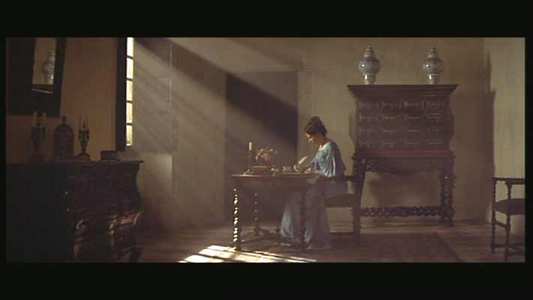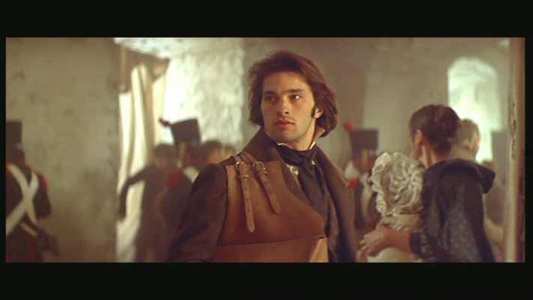The Horseman On The Roof
Introduction
Angelo is an exiled Italian `Carbonaro` (a soldier who has escaped the Austrian presence in his own country) in the South of France, trying desperately to hide from Austrian secret agents, and looking for support from similarly exiled compatriots. He finds that the Austrians are being iaded by a supposed friend of Angelo`s and are carrying out summary executions on all they suspect of being `traitors` and so Angelo moves towards the town of Manosque to continue his mission.
All around him, people are apparently succombing to the heatwave which is affecting the area, but it soon transpires that the illness is actually cholera, which is travelling a lot faster than his horse can carry him.
On his journey, he meets the Countess Pauline de Théus, who is staying in a relative`s house but needs to find her hysband. They join forces in a fairly terrifying journey.

Video
Video is presented in anamorphic 2.35:1 ratio, and appears to be very clean, although the darker scenes are slightly `muddy`. This could well have been the intent of the director though, and I had no major problem with watching the film.
The landscape shote are quite gorgeous, despite many not actually being Provence. Rappeneau says that his idea of Provence needed some Alpine scenery as well - I`m not going to argue with him, and of course, who would know if they haven`t been there!

Audio
The stereo sound is perfectly adequate, although I would have hoped something more could have been provided. Nothing is unclear however.
Jean-Claude Petit`s score is suitably romantic (if almost entirely derivative).

Features
The only extra takes the form of a c.30 minute interview with the director, who manages to squeeze in much you would want to know about the making of the film (including details on how the crows were bred especially), but it would have been great to have had some input by the actors as well - not that this is just me wanting to see more of Juliette Binche of course.
The French release of this film contains a 50 minute documentary which would have been nice to have had here as well.
Subtitles are in English (luckily) and are easy to read, without being too obtrusive.

Conclusion
Jean-Paul Rappeneau`s striking realisation of Jean Giono`s novel is one of the great French films of the 1990s, and is a worthy successor to his own `Cyrano de Bergerac`.
I haven`t read the novel though, and so cannot comment on how true to the text the film is. Rappeneau admits quite freely that he took several liberties with the story (not least the time-frame), and even lets us know that Giono`s daughter even told him that her father would be quite happy for him to change as much as he wanted. It seems that he didn`t take her up on the offer, creating quite a thrilling, highly emotional story.
There are obviously deeply symbolic passgaes in the book regarding the crows, which is obvious from the constant shots of the birds, whether plucking out eyeballs, or flying off startled from various vantage points (crows seem to be able to do `startled` quite well). Some of these shots are plainly CGI, which I was going to have a moan about but Rappeneau mentions that this was one of the first times CGI was used in French cinema, and so we can forgive that.
Many of the human stories in the plot are almost irrelevant, as we quickly learn that the cholera has no respect for class or privilege. Life has become very dangerous, not just threatened by disease, but from those who are scared and paranoid, and will quite happily kill anyone they suspect of `poisoning` their water supplies i.e. anyone they don`t recognise. Even those who Angelo encounters, and who we learn a lot about in a short time, meet a grisly end, making everything all the more pitiful.
Angelo and Pauline, are therefore the only `long term` characters and so the film basically relies on this relationship. Fortunately, the superb acting of Juliette Binoche carries the rather lacklustre Olivier Martinez (Angelo) along with her. It`s not his acting which is particularly dull, just the look on his face for more of the film, but Binoche has no trouble in expressing herself at all.
The penultimate scene, which contains their only intimate moment (and even then there is nothing at all to leer at), is a masterpiece of cinematic romance, and yet Rappeneau was still not happy about it, wishing the script had not used the less formal `tu` (instead of `vous`) - some people are never satisfied!
Checking the DVD comparison sites, it seems that this is an uncut version of the film. So, unless you`re fluent in French and really want the extra documentary, I thoroughly recommend this. It`s a very old-fashioned story, but told in a slightly less than traditional manner, and will keep you watching.
Your Opinions and Comments
Be the first to post a comment!